Our young gun Melbourne entrepreneurs under 40 making it big in business
Victoria’s most successful young entrepreneurs are problem solvers with a flair for innovation and their lucrative accomplishments speak for themselves. They’ve shared exactly what it takes to make it big in business.
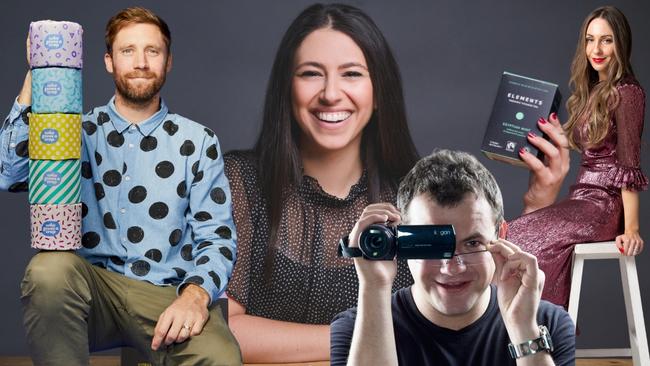
Business
Don't miss out on the headlines from Business. Followed categories will be added to My News.
Sometimes it takes a new perspective to solve an old problem.
And sometimes, it takes a new generation to even recognise there’s a problem at all.
Many of the entrepreneurs behind Victoria’s fastest growing and most promising companies have something in common: they’re young.
With a keen eye for opportunities in a crowded marketplace, they’re all problem solvers with a flair for innovation, identifying better ways to serve consumers, businesses and other organisations.
Here, we profile some of the state’s best and brightest young entrepreneurs and executives across a range of industries, and share some of their advice for those who would follow in their footsteps.
All of them are younger than 40, but some have already been in business for the best part of a decade or longer.
Many – such as “vitamin tea” trailblazer Julie Hirsch, the Telstra Victorian Business Woman of the Year – have won awards for their rapid and considerable success.
Some, including 24-year-old logistics prodigy Jackson Meyer, now oversee operations with offices around the world.
Others, including Kogan.com founder Ruslan Kogan, have built their enterprises into billion-dollar companies.
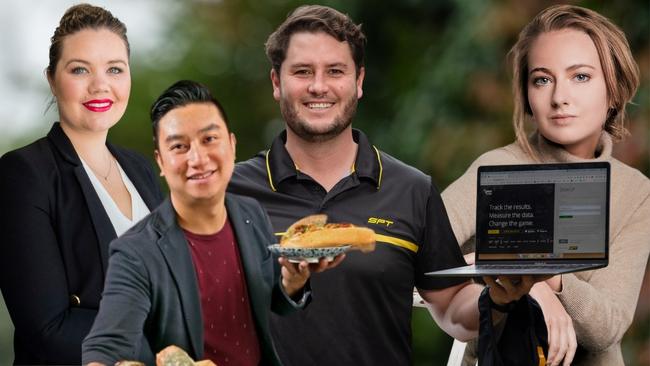
But all of them are turning heads as they shape the next generation of businesses flying the flag for Victorian enterprise and building on Melbourne’s standing as one of the world’s great centres of commerce and innovation.
Of course, all successful businesses need the cards to fall their way at times, however there’s something else these entrepreneurs share: an appetite for grunt work and a willingness for sacrifice.
Aimee Marks, the founder of baby and sanitary products group The Tom Co, notes that while others were partying and travelling when she was in her 20s: “I was on the floor of a small office mapping out a delivering plan to Woolworths.”
Kogan says entrepreneurs who want their creation to thrive need to be “athletes”.
“Once the invention is conceived, an entrepreneur then becomes an athlete because you have to work your butt off in order to turn your ideas into reality,” he says.
In an era where the coronavirus pandemic has also cast a dark cloud over the economy, the young entrepreneurs are also beacons of hope, optimistic about the outlook.
Bao Hoang, who has built Vietnamese eatery Roll’d into chain with more than 80 outlets, says for all its travails, Melbourne is still a great place for enterprise.
“The way Melbourne faces adversity and accepts diversity is remarkable, making it a perfect location to launch and grow a new and unique business, especially one rich in heritage and stories to be shared,” he says.
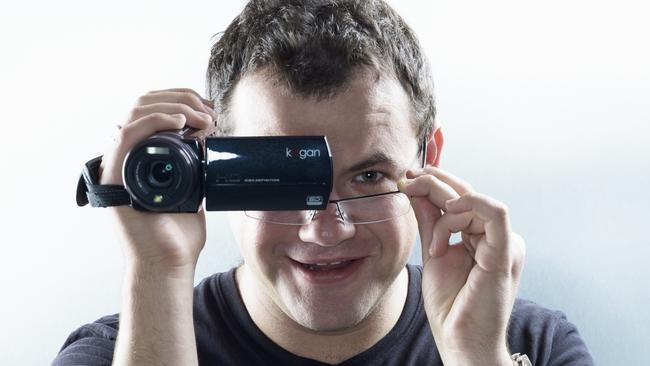
RUSLAN KOGAN
Age: 37
Business: Kogan.com
Role: Founder, chief executive
From the garage of his childhood home in Elsternwick, to the head of a company throwing off $1bn in sales every year.
Ruslan Kogan, the founder of online retailer Kogan.com, has established himself as one of the nation’s most successful entrepreneurs, whatever the age.
So what advice does he have for young Australians with a passion for business?
“You need to be part inventor, part athlete,” Kogan says.
“You have to be an inventor because you need to look at the marketplace and invent something that hasn’t existed before, and it needs to help people in a unique way.
“Once the invention is conceived, an entrepreneur then becomes an athlete because you have to work your butt off in order to turn your ideas into reality.”
Kogan founded Kogan.com in 2006, leaving his job at business consultancy Accenture to win customers over with cut-priced flat-screen TVs.
It listed on the Australian stockmarket in 2016 at $1.80 a share.
Today shares in the group are worth almost $20 as the coronavirus pandemic drives a fundamental shift to online commerce and service delivery.
“There is a retail revolution taking place with more and more Australians realising the convenience of online shopping,” Kogan says.
“Once they discover the benefits of shopping from the comfort of their own homes, I can’t see why anyone would go back to the old way of doing things.”
The 37-year-old says he has made plenty of mistakes along the way.
“Just make sure that when you get decisions wrong, you learn from it and become a better decision maker the next day.”
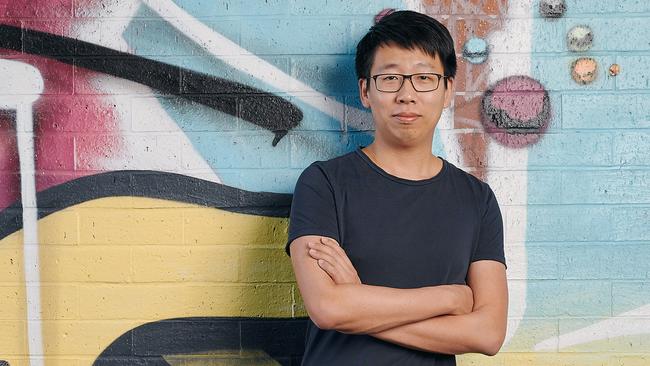
JACK ZHANG
Age: 35
Business: Airwallex
Role: Co-founder, chief executive
Jack Zhang was running a cafe in the Docklands with friend Max Li when he had his light-bulb moment.
The business was performing well, but Zhang says one of its “biggest headaches” was the hefty foreign-exchange fees on payments for imports such as coffee cups and labels.
In one instance, it was charged $US600 on a $US15,000 order – a hefty 4 per cent fee that would ultimately eat into the cafe’s profitability.
“At that time, I had worked as a FX solution architect at some of Australia’s largest banks, so I knew there had to be a better way to solve this problem using technology,” he says.
Zhang and Li joined forces with three peers from their days as students at the University of Melbourne to launch Airwallex – a financial technology business aimed at providing high-speed and low-cost digital payments internationally.
Five years on, the group has 13 offices worldwide and more than 450 staff. Of those, more than 100 are based in Melbourne.
In April, despite the rapidly developing coronavirus pandemic, it attracted a $US160m ($250m) funding injection from investors – a deal that effectively valued Airwallex at $2.5bn.
Zhang, who moved to Melbourne from China when he was 15, advises aspiring entrepreneurs to “start making noise about your ambitions or ideas now, even if they’re not fully formed”.
“I was already reaching out to venture capital companies when Airwallex was just an idea on a piece of paper,” he says.
He also cautions against making revenue and profitability a short-term priority, “tempting as it may be”.
“You need to balance making money with long-term planning and growth, and sometimes that means reinvesting that money into product innovation.”
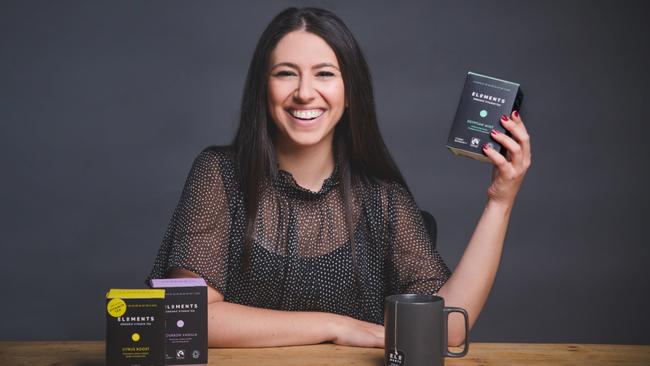
JULIE HIRSCH
Age: 30
Business: Eloments Natural Vitamin Tea
Role: Co-founder, chief operating officer
Within six months of launching their range of Fairtrade teas blended with vitamins and minerals, Julie Hirsch and friend Nicole Lamond hit a pivotal milestone.
Woolworths had taken a shine to their products and agreed to roll them out in three quarters of their stores — some 750.
Now, less than two years after its launch out of a South Yarra office, the Eloments organic tea range — touted by the company as the world’s first completely natural vitamin tea — is sold at 1500 stores in Australia, Britain and Finland.
The rapid growth in the brand belies a far more painstaking gestation process.
Hirsch and Lamond, the chief executive, spent two years on research and development, working with nutritionists and developing relationships with Fairtrade farming cooperatives to ensure they had reliable sources of supply.
During that period, there were “many moments” when the self-doubt crept in and Hirsch questioned whether they could turn their vision into reality.
“I wish I had known that the mistakes I made along the way were part of the journey, and didn’t diminish how far we had come,” she says.
Hirsch was this year named the Victorian winner in the prominent Telstra Business Woman of the Year awards and says that success has also proved valuable in building the brand.
“I’m not sure if it’s coincidence, but the week after the awards were announced in the Herald Sun, I went into my local Woolworths to find all but one box of our teas sold out,” she says.
While the pandemic disrupted supply chains broadly, Hirsch says Eloments has been able to keep buying from its partner cooperatives.
With supermarkets trading through lockdowns, it has also been able to continue selling its products, and Woolworths this month has started stocking its latest blend, Eloments Urban Defence.
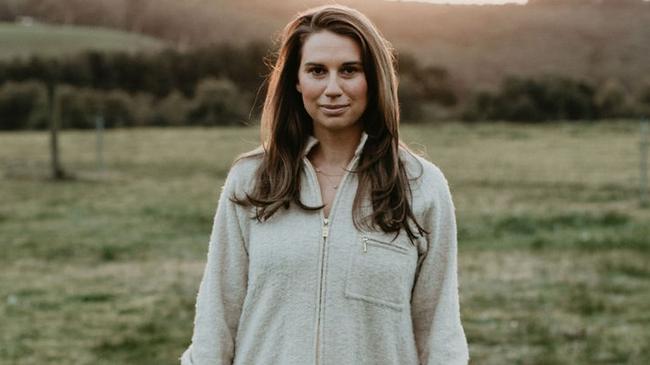
AIMEE MARKS
Age: 33
Business: The Tom Co – TOM Organic and Tooshies by TOM
Role: Founder
If Aimee Marks could send a message to her younger self about succeeding in business, it would be a simple one: Trust your intuition.
“It’s important that you back yourself, stay true to your core values and surround yourself with people who can give you advice and share your vision,” she says.
“When you do this, good things happen and it’ll always work out.”
Not that success has eluded her. Quite the contrary.
Marks was in her early 20s when she launched the TOM organic tampon.
Eleven years on, her business supplies a wide range of period and baby-care products with organic ingredients across the TOM Organic and Tooshies by TOM brands.
They are stocked by Coles, Woolworths, Chemist Warehouse and a host of other retailers across the nation.
She says young entrepreneurs also shouldn’t underestimate the “hustle and hard work” required in the early days of a business.
“In my 20s, when others were partying and travelling, I was on the floor of a small office mapping out a delivering plan to Woolworths,” she says.
Marks believes a silver lining from the pandemic is that on the other side, there’ll be “a huge opportunity for female entrepreneurs to develop businesses that will be required to support the new ‘normal’ ”.
“People are wanting to make positive choices in a climate that feels overwhelming and more than ever are seeking to connect with businesses that make a difference,” she says.
She’s also optimistic about the outlook for the business, and plans to “broaden our impact to be in as many women’s hands globally as possible”.
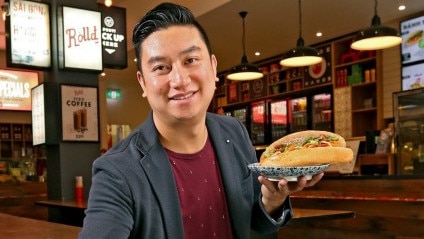
BAO HOANG
Age: 38
Business: Roll’d
Role: Founder, chief executive
The hardest thing in business, says Roll’d founder Bao Hoang, is to start.
“Take the leap,” Hoang urges.
“Stop procrastinating, making excuses, or waiting for the ideal scenario. Read, research, network, work damn hard — just do.”
Hoang, 38, trained and worked as a physiotherapist before deciding his real passion was to run his own business.
Vietnamese eatery Roll’d was launched in 2012 with a single store selling rice-paper rolls and banh mi in Goldsbrough Lane, in the heart of Melbourne’s CBD.
Hoang’s mother Phien – his parents arrived in Australia as refugees from Vietnam – would prepare core ingredients at her Oakleigh home before Hoang would drive them into the store each morning.
Today Roll’d spans 82 outlets, generates $75m in annual sales and is rolling out a fleet of food trucks and a meal-box subscription service.
The coronavirus pandemic has dealt Melbourne and the hospitality sector a particularly savage blow but Hoang says the city remains a great place to do business.
“The ‘foodie culture’ of Melbourne has suffered astronomically, but we are positive it will thrive again,” he says.
“The way Melbourne faces adversity and accepts diversity is remarkable, making it a perfect location to launch and grow a new and unique business, especially one rich in heritage and stories to be shared.”
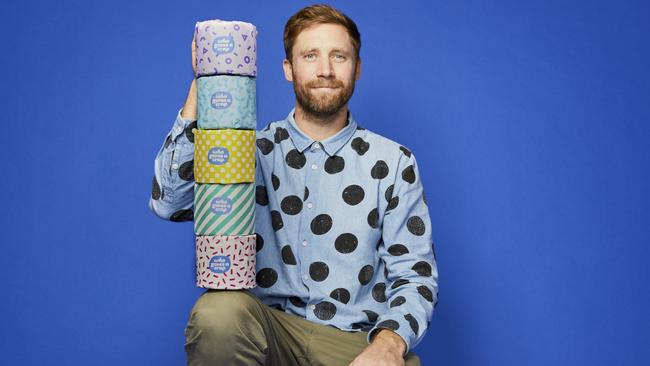
SIMON GRIFFITHS
Age: 37
Business: Who Gives A Crap
Role: Co-founder, chief executive
It was the epiphany that spawned a burgeoning eco-friendly toilet paper business.
Simon Griffiths, who had spent time working and volunteering in developing countries, had seen first-hand how a lack of access to sustainable funding curtailed the work of aid organisations.
One statistic in particular stood out: that 2.4bn people globally had no access to a toilet.
“It dawned on me that to get more funding, instead of just relying on philanthropy, organisations could tap into the trillions of dollars changing hands in the economy through the sales of goods and services,” he says.
“Then one day I walked into the bathroom and had a quarter-second epiphany: we could sell toilet paper, donate half of the profits to help fund organisations building toilets and call it Who Gives A Crap.”
It was 2012 when Griffiths and two friends launched the business, which also sells tissues and paper towels. Including contractors, it now has a staff of 90.
Last year, the group’s donation clocked in at $5.85m, taking total donations since 2013 to $8.35m.
The pandemic, famously, up-ended the group’s core market this year.
“At the panic buying peak, we were selling 28 rolls of toilet paper per second and our waitlist grew to over half a million people,” Griffiths says.
Turnover has since slowed after households stocked up earlier, but direct-to-consumer sales are still high as more people are shopping online, he says, and the company is “fully stocked”.
The pandemic also provided a valuable lesson: take nothing for granted.
“Bathroom habits are actually pretty predictable, which means that our business is usually fairly predictable as well,” Griffiths says.
“The pandemic showed us that all of that can change in an instant.”
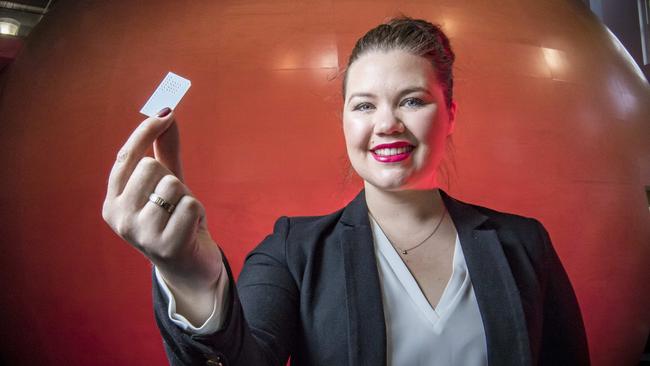
JACQUELINE SAVAGE
Age: 31
Business: MedCorp Technologies
Role: Founder, chief executive
Losing a best friend to cancer cemented Jacqueline Savage’s ambition to leave her mark on healthcare.
Savage, who was studying biomedical engineering at Swinburne University of Technology at the time, launched MedCorp Technologies in 2013.
The company has developed a wearable device that can continuously monitor a patient’s temperature, alerting the patient and medical staff to any early sign of infection.
That can be lifesaving for immune-compromised patients, such as those receiving chemotherapy as part of cancer treatments.
“I would regularly go into hospital to visit my friend during her weekly chemotherapy treatment and I began to notice how patient care and monitoring could be improved with the development of new technologies,” Savage says.
“As a product development engineer in the making, my focus was tuned into how patients and hospital staff were having to work around poorly designed systems and devices which hadn’t changed in decades.”
The 31-year-old says the coronavirus pandemic is likely to accelerate the transition from “in-hospital” care to the development of systems and technologies that support “in-home” care and monitoring.
“This has been a very slow-moving trend over the last 10 years but the current pandemic has accelerated its trajectory and emphasised its importance”.
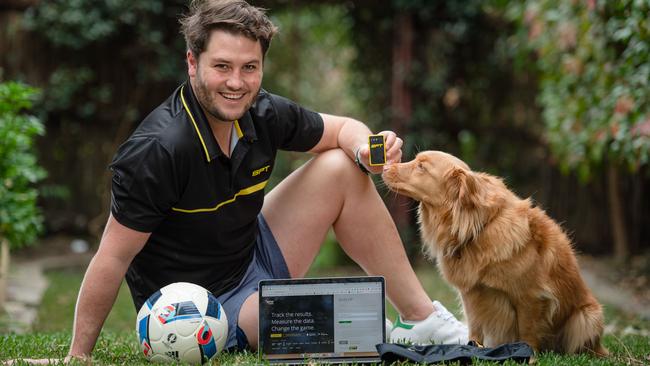
WILLIAM STRANGE
Age: 31
Company: Sports Performance Tracking
Role: Founder, chief executive officer
In the business world, the halls of fame are densely populated with those who were mediocre pupils. That should serve as inspiration for William Strange.
Not one to mince words, the 31-year-old says that in school, he was a “bad student” and quickly realised he’d do well only in fields that interested him.
It was 2013 when Strange founded his first business, subscription-based Three65 Underwear, helped along with an investment from friend and then Hawthorn Football Club player Cyril Rioli.
He later sold that business, which featured on Ten Network’s entrepreneurial talent quest Shark Tank, to focus on his other enterprise, Sports Performance Tracking.
SPT provides wearable technology and software that helps sports teams improve their performance, with a focus on community clubs and schools.
Clients have come from as far afield as the US, Britain and Switzerland.
The coronavirus pandemic naturally upset the apple cart, and many customers disappeared earlier this year as sporting seasons were postponed or cancelled.
Still, Strange says the company is “starting to see things turning” and expects many clubs will shun higher-priced technology in favour of that offered by SPT as they move to cut costs.
His advice for young entrepreneurs starting out? “Get ready to grind”.
“It’s certainly not easy and … you really need to have the stubborn personality type – or at least start to build it,” he says.
“No matter what, keep moving forward and keep achieving”.
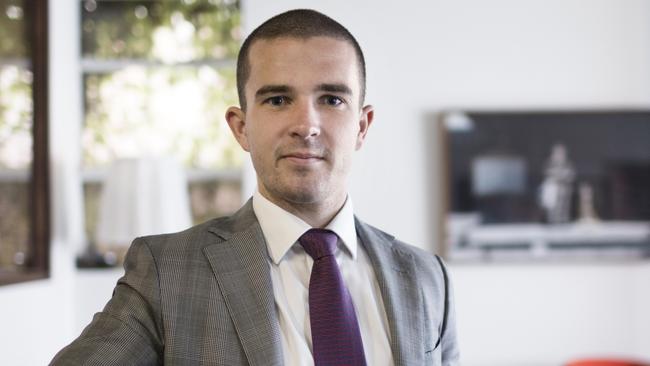
JACKSON MEYER
Age: 24
Business: Verus Global
Role: Founder, chief executive
Fourteen offices spanning Australia, Hong Kong, China and Britain. More than 50 employees. A turnover of more than $40m the past financial year.
They’re striking numbers for a business founded less than two years ago by Jackson Meyer, who was then 22.
Meyer says there was a gap in the freight and logistics sector for a player that could shake up what was a “traditional and outdated industry by using technology and a modern approach”.
Twenty months and “a lot of sleepless nights” later, the track record speaks volumes.
Verus handles freight forwarding. “Basically we move things from A to B, and handle all the logistics involved,” Meyer says.
When he launched the business, at Cheltenham, in Melbourne’s south east, he was “extremely micromanaging”.
“I quickly identified that this was certainly not the way to go,” he says.
“Trying to tell someone who is a professional – and has been for 20-plus years – how to do operations does not make any sense.
“If you are lucky enough to have a great team, let them do what they do best. Always hire people better than you at their role.”
The board at Verus – the Latin word for “true” – is chaired by Andrew Walker, the founder for healthcare group Aspen Medical.
But it’s Meyer, with his rapid success, who’s turning heads.
He was this year ranked by US business magazine Forbes in the top “30 Under 30” entrepreneurs in industry, manufacturing and energy across Asia.
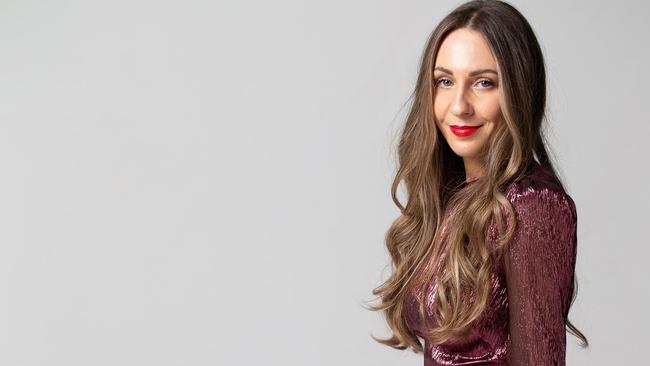
MIA KLITSAS
Age: 37
Business: Moxie
Role: Founder, director
Find a pain point and solve it.
For Moxie personal care founder Mia Klitsas, being annoyed by finding rogue tampons rolling around the bottom of her handbag spawned a business that has shaken up the nation’s feminine hygiene market.
Moxie was launched in 2006, winning over customers by selling tampons in brightly coloured tins that don’t fall apart.
“The idea was to package them in something more robust than a flip-top cardboard box,” Klitsas says.
“I knew that by solving this issue for myself, I’d likely solve it for others, too.”
The business, which has expanded into other feminine hygiene lines, was launched from some borrowed space at her father’s knitwear factory in Abbotsford.
It now operates from North Melbourne selling through Woolworths, Chemist Warehouse, My Chemist and online through its website and a popular monthly subscription box.
A business achievement Klitsas is particularly proud of is Moxie’s “Pads for Pads” initiative, which provides reusable period products to school girls in Uganda, allowing them to continue their education uninterrupted.
Klitsas, who was named Telstra Young Business Woman of the Year for Victoria in 2014, advises emerging entrepreneurs that it’s OK to take it slow — business is a marathon, not a sprint.
“More specifically, I probably would’ve paid more attention to margins early on and given myself a bit more room to move,” she says.
“I learned very quickly that initiating a price increase at the retail level is incredibly difficult.”
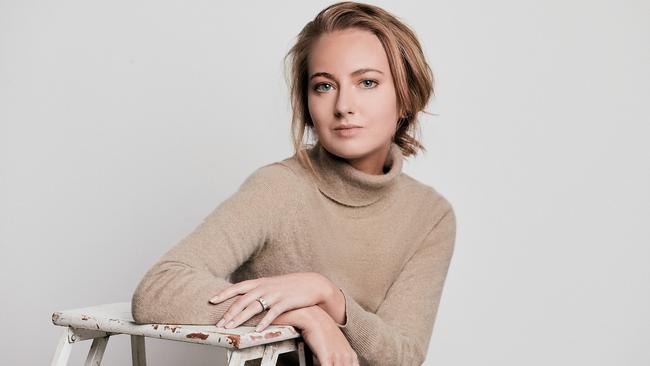
OLIVIA MOLESWORTH
Age: 24
Business: Bromleigh Capital
Role: Founder, managing director
Optimism and confidence are not normally in short supply among technology entrepreneurs.
But a lack of the two is the biggest regret Bromleigh Capital founder Olivia Molesworth singles out in what has been a short but sweet business career to date.
“When I started the company, I was so cautious and convinced it would fail that I was too nervous to plan very far into the future,” Molesworth acknowledges.
“As a result, I was really taken aback by the level of demand and how grateful customers were.”
Molesworth launched Bromleigh in 2018 after observing how difficult it was for many start-up technology businesses to secure simple and straightforward finance.
Bromleigh provides business loans up to $100,000 at a fixed rate capped at 14.9 per cent and no other fees.
The company, launched from her Melbourne CBD apartment, has quickly grown to manage a revolving loan book of $1m.
“There were all these great, small entrepreneurial businesses that just couldn’t grow because they couldn’t get capital — they didn’t need equity, they needed debt,” she says.
While the pandemic has plunged the nation into recession, Molesworth says the shift towards online commerce will benefit businesses that seek out Bromleigh’s services.
“There is no doubt that there is a pressing need for our financial products,” she says.
ONES TO WATCH
● CYAN TA’EED – Hey Tiger (chocolate)
● JESS HATZIS-WALKER and BREE JOHNSON – Frank Body (skincare)
● AARON SMITH – KX Pilates (gyms)
● MICHAEL MACRAE and JAMIE SHOSTAK – Appetiser (app development)
● ZAC DUFF and NUMA BERTRON – JigSpace (software services)
● ROBERT TADROS – Impressive (digital marketing)
● NICK PEARCE – HoMie (retail and social enterprise)
● JOSHUA FEGAN – Althea (medicinal cannabis)
● DOMINIC YAP – Zeller (financial services)
READ MORE:
MELBOURNE’S NEXT GENERATION OF MOVERS AND SHAKERS
